- Details
-
Published on Saturday, 30 January 2016 18:19
Interview with: Tomas Almgren
Conducted by: T.V.
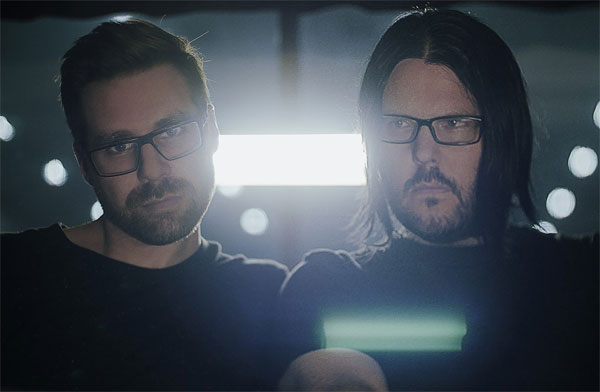 One of the albums that we at Terra Relicta praised so much last year was of course Hearts Of Black Science' third full-lenght named Signal. It ended up second on our Terra Relicta Top 20 of 2015, was selected as Album Of The Month - November 2015, made entry into a couple of our personal top 10 charts, so all in all it's one of the greatest releases that came out last year. Fans of the Swedish duo, which consists of two multiinstrumentalists, Tomas Almgren and Daniel Änghede, had to wait six long years for this masterpiece to came out, since their previous album was released. On Signal, Tomas and Daniel developed their outstanding dark atmospheric pop music into unbeliveable heights and have without any doubt set some new standards into this, sometimes unduly overlooked style. Hearts Of Black Science were formed back in 2005, their debut album, The Ghost You Left Behind, saw the light of the world two years later and the sophomore one, The Star In The Lake, in 2009. They mention to be inspired and influenced by varius things, from horror movies, everydays life, power plants, to bands and artists like are The Cure, Fields Of The Nephilim, Type O Negative, Crippled Black Phoenix, Depeche Mode, M83, Godspeed You! Black Emperor, Mono, Ultravox and yet much more, but even so, Hearts Of Black Science are on a mission to create their own and unique sound with haunting melodies and dark atmospheres which are rarely to be found in such fractions. More things about the band, about new album, production, lyrics, future plans and many other background stuff, were explained by friendly Tomas Almgren who gave us a really detailed insight into it.
One of the albums that we at Terra Relicta praised so much last year was of course Hearts Of Black Science' third full-lenght named Signal. It ended up second on our Terra Relicta Top 20 of 2015, was selected as Album Of The Month - November 2015, made entry into a couple of our personal top 10 charts, so all in all it's one of the greatest releases that came out last year. Fans of the Swedish duo, which consists of two multiinstrumentalists, Tomas Almgren and Daniel Änghede, had to wait six long years for this masterpiece to came out, since their previous album was released. On Signal, Tomas and Daniel developed their outstanding dark atmospheric pop music into unbeliveable heights and have without any doubt set some new standards into this, sometimes unduly overlooked style. Hearts Of Black Science were formed back in 2005, their debut album, The Ghost You Left Behind, saw the light of the world two years later and the sophomore one, The Star In The Lake, in 2009. They mention to be inspired and influenced by varius things, from horror movies, everydays life, power plants, to bands and artists like are The Cure, Fields Of The Nephilim, Type O Negative, Crippled Black Phoenix, Depeche Mode, M83, Godspeed You! Black Emperor, Mono, Ultravox and yet much more, but even so, Hearts Of Black Science are on a mission to create their own and unique sound with haunting melodies and dark atmospheres which are rarely to be found in such fractions. More things about the band, about new album, production, lyrics, future plans and many other background stuff, were explained by friendly Tomas Almgren who gave us a really detailed insight into it.
T.V.: First of all I must congratulate you for releasing such a stunning album as it's Signal. I'm interested how do you feel about it as it came out quite a long time after your previous album was released?
Tomas: Thank you very much for liking the album and having been so supportive of it on your site. We're incredibly proud of Signal. It's been a long time coming. On the whole it's my favorite record of ours. It completes an idea we had since our first song ("Empty City Lights") to make this sort of epic and emotional synth/guitar combination. I really feel that Signal is the closest to what we were aiming for. It's big, dark and beautiful, it's pop and melancholy all wrapped together. It feels like we really went out of our way to finally get "that record" made. And the response to it has been amazing. It's also incredibly satisfying to finally have it out. We've teased it for a long time and in a way it feels like exhaling for the first time in years. But while people have been waiting I think we've also seen a stronger fan base grow up around it as the years have gone by. People have really been rooting for it and it's been great to have that support build up and stay with us for such a long time. It's rare and very humbling.
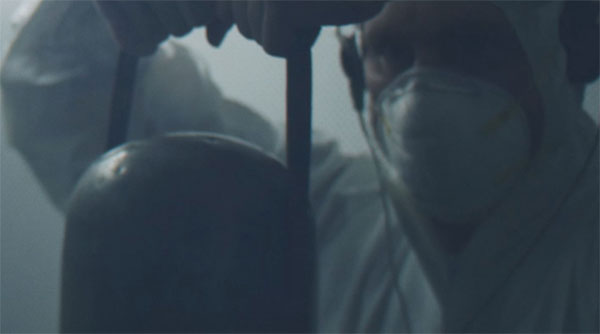 T.V.: And what was going on with Hearts Of Black Science since 2009 when you released The Star In The Lake?
T.V.: And what was going on with Hearts Of Black Science since 2009 when you released The Star In The Lake?
Tomas: The first year after The Star In The Lake we took a break from making music as I moved to Stockholm and started a career as a designer in the games industry. The album hadn't really gotten the exposure/distribution we had hoped for despite good reviews and it had been a bit of a chaotic time for the band in general. The Lake was made on the heels of a lot of exorcised band drama just out of the way and it had been a bit of an emotional puzzle to get it done. I kept writing songs, as I do anyway, so there was a bank of tracks building up. But I don't think we really talked about the third album as an official thing for maybe a year until we finally decided to start recording it. The first thing we did was trying to release an EP (We Saw The Moon) on our own. Mainly to fill the vacuum the break had created for those still asking about new music and secondly to see how far we could go without a label backing us. Which, as it turns out, was not very far as most media and distribution channels don't like unsolicited material. But the EP came out sounding pretty good and we were inspired to keep going at full speed again. Signal took form and some tracks from the EP were re-worked as we felt they hadn't really been properly released, and deserved a second chance as they were always supposed to be part of the third album. The B-sides & Remixes collection was released digitally somewhere in that time as well.
T.V.: Can you also tell me where do you see the main differences between Signal and previous two albums?
Tomas: The main difference between the albums is on one hand just growth. You know, growing up as people (it's been 10 years since The Ghost after all) and growing in our craft as musicians and how we make music. On the other hand Signal is by far the most ambitious album we've made. On the first album we were still trying to figure out what the sound was going to be. On the second I felt we rushed a few things and some songs were just left unfinished. But some of our best work is on there and it's where we really started to go a bit "gothy". Each album has revealed something new. And the following album has usually grabbed that new idea and extrapolated it and spun it into new ideas again. So the sound keeps evolving based on what came before. Signal is currently the sum of all that. It's steeped in reverb and cinema and big emotions. I added a lot of dirt to everything. VHS static and vinyl crackle mixed with large spacious samples and synth pads fed through distortion effects. Big melodies. We wanted it to sound a bit retro sci-fi but without the modular synth noises often associated with that genre.
T.V: I believe that also the album title, Signal, must have kind of deeper meaning and a connection with all what happened to the band in those years?Tomas: On a surface level there was always an idea to make the album have this retro sci-fi feel. It's more obvious in some songs than others. It was never meant to be a full on theme album. More a conceptional framework to bounce ideas within. So the artwork I painted was based on that notion and then we needed a title to kind of wrap a bow around the whole thing. So the "signal" is this idea of being lost somehow and getting some sort of sign of hope at the horizon. Some sort of signal that you can cling on to, and if you follow it, it will lead to a better place or state of being. It's not religion or spiritualism or any of that stuff. It's also in some sense our collective dream of leaving this solar system. The calling of the black void above. Our need to go there one day and find out for ourselves what the deal is. Daniel and I had both gone through some tumultuous life changes and a lot of the songs are about getting out of bad relationships and the feeling of hopelessness one can feel when stuck in a rut in life. I was in a particularly bad state for a short while about three years ago. Like full blown mid life crisis stuff. And the sense of being lost emotionally and sort of drifting away from humanity was very profound and frightening. And the recovery from that started out as this very faint signal in the brain saying, "hey, maybe it will actually be alright again someday". So to me the title is about hope. And yes it's fun to think of it as a metaphor for the band finally coming out with something new. A radio signal from some long lost outpost that used to broadcast but went dark. But I wouldn't say that was a huge part of it. Also if you tilt the cover a little the triangle making up the A in signal sort of disappears and it looks like it's called Sign L - which could mean Sign of Life maybe. I wish I could say that was intentional. But it's not. Or is it...
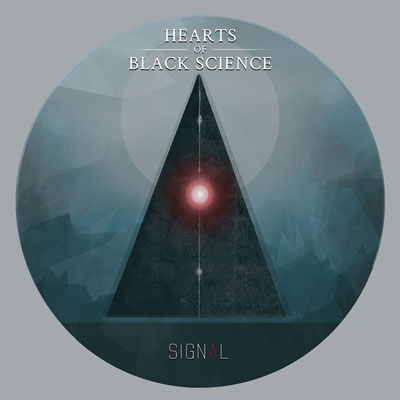 T.V.: Very interesting... Now, as you mentioned that you've made the front cover artwork by yourself and you've already pointed out that there's a connection with music and lyrics, I wonder if you can give me kind of a deeper insight into it?Tomas
T.V.: Very interesting... Now, as you mentioned that you've made the front cover artwork by yourself and you've already pointed out that there's a connection with music and lyrics, I wonder if you can give me kind of a deeper insight into it?Tomas: I've been painting as a hobby for a long time. Since I was a kid, really. I'm still a novice in many ways but I really enjoy it. It's relaxing, zen stuff. But as far as connecting to lyrics and music I think I'm very pragmatic about the artwork. It's often very literal and kind of on the nose. The cover for our first album is basically the band name in pictures. Heart, Moon, Cog -
Hearts Of Black Science. It's not very clever or artsy but it got the message across. "This is what this band sounds like". The
Signal cover has the earth and the moon, the black triangle and then the signal itself - glowing red from within the center of it all. Or maybe it's an eye. Something unknown watching the calm blue orb. A friction against harmony that's sort of mirroring the music itself. I love bands that seem to have a through line. Like
Tool, for instance. Some connecting tissue between the art and the video and the music. Since I had gone to film school, and had tried my hand at a career in film, I also make the videos. And now that I make video games for a living, I started to incorporate that aesthetic. I'd use game engines to make parts for videos. You see it in the
Signal 1 & 2 teaser videos and the recent "Unfolding" video. It's the same approach as with the music. It's guerrilla and sort of rough around the edges. I like that.
T.V.: So there must be also kind of a connection between lyrics and videos you've released so far...Tomas: The lyrics for "Protector" deals with sense of self and identity and trying to stay grounded. To become stronger after adversity. Especially in the context of me maybe having kids one day. The fear of having to give a lot of oneself over to this unknown entity. To keep your own identity as the person you've become intact while simultaneously give it all up for someone else. It was something me and Daniel had a chat about during a break in the recording of some other song. I thought it was interesting. Much later I had been experimenting with an old macro lens and noticed that my hands looked kind of interesting when I put them in front of the camera to move this LED light. So I started to flip the images in the computer and the results were kind of alien and strange. I did some variations on that idea. Anyway, time came to make the "Protector" video and we went with this idea of a lab experiment gone wrong and the creature in the canister is mutating out of control as the lab struggles to contain it. We shot it in a day at our studio space. Just the two of us. And then I added all the alien hand stuff in post. The lyrics and the driving music works pretty well with the industrial backdrop and the nods to 70's sci-fi horror. It's not a straight story. There was no script. I think both lyrics and videos should stay fairly vague around the central idea of the song and not become to literal. For "Wolves At The Border" we just got really lucky with the insane mist and I told Daniel that I wanted to go to this particular place and film a bunch of stuff. While we were driving there I filmed a lot of footage through the windscreen. The song is about two people who have just lost their connection to each other and are drifting apart because of this betrayal that occurred. Lies are like wolves in sheep's clothing. Lurking just at the border of truth, waiting to get in and fuck everything up. That's why I shot a lot of the footage from a Wolves point of view. Gliding over the grass. Looking for a way in. The car stuff feels like a serial killer looking for prey. Maybe it's the masked figure in the end. Two hunters roaming in the fog. Different but connected at some primal level. It's abstract and very gothic. I don't think I'm the best artist and that's why I should have the job. All the imagery filters through my sensibilities and that creates a feeling of consistency, because I have a hand in both the sound and the lyrics and the art. I also really love doing it and I'm cheap.
T.V.: As you were mentioning the song "Wolves At The Border"... I find this one pretty outstanding and I wonder how it came to collaboration with Heike on this one?Tomas: Wolves had started out as a straight pop song. That early take is on the pre-order 2 CD version of
Signal. But it had never clicked with me and I think Daniel agreed. It wasn't horrible, but it wasn't close to magic either. We loved the core of it but the stuff around it was off. I didn't want that version on the album. We had tried doing some minor changes a bunch of times but the arrangement was all wrong, and we couldn't fix it with subtle changes. In the end, out of some desperation, I ripped almost everything out, except the core elements, and started to switch out sounds until the whole vibe was different. Then we added new guitars and drumbeats and built it up again. It got darker and more ominous. And a lot better. Daniel had been in contact with Heike online for some time. So it was he who introduced me to her music and the idea of having her feature on a track. I knew about
Draconian, of course, but not her solo stuff. I liked it a lot and thought it could end up being a cool collaboration. She obviously has a great voice. I don't think anyone would have guessed that
Hearts Of Black Science and
Draconian would do something together, so the sheer weirdness of it really spoke to me. It was curiously unexpected. I mean that in a good way. So Daniel brought her over to the studio and we all met and I recorded her over the course of two days. It was all very casual and friendly and collaborative. Since we already had the lyrics and some sort of idea of what we wanted her to do on Wolves it ended up being a pretty straight forward process. She had fun with it and added a lot of nuance and harmonies and a nice thick layer of gloom to the whole track. It was fun working with her and it added a lot to the song.
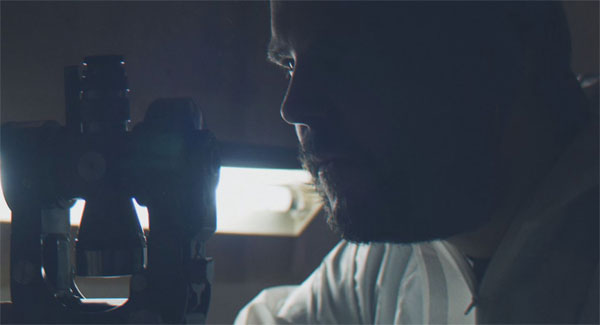 T.V.: Yes, she's a great singer and her voice fits so well into this song. But beside Heike you had also one another guest, this was the American singer Chrysta Bell, who is famous for recording with movie director David Lynch, and can you tell me more about how this collaboration started?Tomas
T.V.: Yes, she's a great singer and her voice fits so well into this song. But beside Heike you had also one another guest, this was the American singer Chrysta Bell, who is famous for recording with movie director David Lynch, and can you tell me more about how this collaboration started?Tomas: Daniel and Chrysta had been emailing a bit back and forth. I think it started with Daniel telling her what a huge fan he was of her first album (which is pretty damn good). At some point she checked out our music and liked it. So the idea of collaborating had been thrown around, I guess. About six months to a year later we were just about done with recording the album, and "Unfolding" was the one song that we haven't done any vocals for. And we didn't really have a clear idea of what we wanted the vocals to be. It was a pure instrumental track for quite a while. Around this time Chrysta was coming to Sweden to play a festival not far from our little town. She was more or less just landing, playing and then boarding the next flight. So we drove out there to meet her and to see the show. She did an amazing set and afterwards we hung out for a bit and talked shop. We all got along immediately and it was clear that everyone was excited about working on something together. We thought she would be particularly great on "Unfolding". So we sent it to her. She listened to it on her flight back and it was on. Many months later me and Daniel cracked the code of the "Unfolding" vocals. He found this really great melody. And I wrote some lyrics that happen to sort of define the signal theme mentioned earlier. We sent it over to Chrysta and I think it was helpful. The song doesn't have any verses or choruses, and it's tricky to simply start laying down vocals on a song that just builds around a single melody. She also had a lot of other stuff going on but thankfully managed to find a bit of studio time in L.A. and just laid down a ton of vocal takes. Since we couldn't be there to do it with her she basically provided us with every vocal and harmony take imaginable. There was a lot of great stuff in there. So I took all that and then spent some time building one solid take out of it. I would mail each version to her so that she could have a say in it and stay involved. She had some notes. I adjusted some things. Eventually it all clicked into place. For the album version we let the track build with Daniel singing the first half of the song solo, and then we slowly fade in Chrysta's vocals. Because the whole song builds like that. Slow and steady. It just works better. But it always pained me a little to ditch her vocal, so on the remix that I made for the bonus CD, I added her vocals back in on the first half. It was a very cool yet strange experience to work like that. The result is great though.
T.V.: Indeed it's a great result! Now please tell me who's responsible for something inside Hearts Of Black Science? Who stands behind music, who writes the lyrics,...?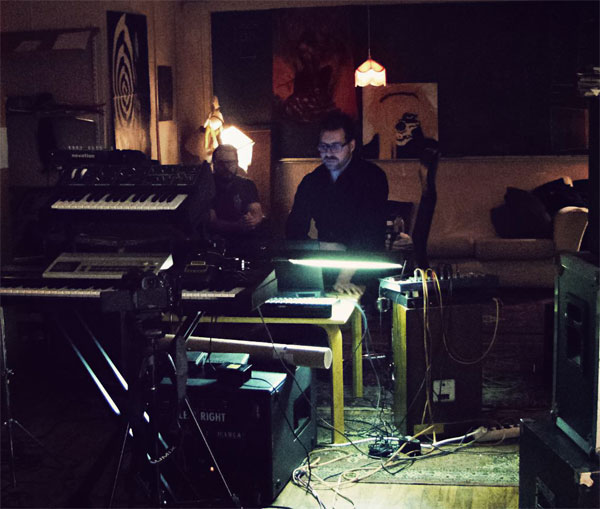 Tomas
Tomas: Generally I'll write the basis for the songs on my own. I spend a lot of time on getting the main part of a song right. I try a lot of versions until I'm content. I have small set up at home where I can dig in and focus on specific parts and get into the programming of sounds and so on. The songs are instrumental at this stage, but they usually have all the parts. Verses, choruses, beats, bass lines and hooks. But that too varies a little from song to song. Daniel has written a handful of demos across the three albums as well. But I'm probably responsible for something like 90% of the songs in terms of having written that first version of them. In the studio we will both listen, pick apart and make changes if needed. If there are parts missing we will do a quick copy-paste of some beats and then fix it there together. I sort of wear the producer hat in the studio and Daniel gets to be a bit more free and creative as we tackle his parts. Usually it starts with guitars. I will put the song on loop and Daniel will jam over that for a while until something starts to sound good. Daniel is an amazing guitar player. I always enjoy listening to him trying out ideas and melodies. I will offer up suggestions while he's playing and once we're both happy we'll record it. Then we build guitars in layers like that. In terms of bass guitar the decision is made whether to exchange my synth bass completely or to record a second dub over the synth to add more flavor. On some songs we've skipped the bass guitar altogether. Vocals are almost always the last thing we do. Daniel will listen to the song over and over and hum different melodies to himself. Once he's got an idea he wants to try we record a couple of takes of him singing it. Then we listen a few times and it either stays in or we start over. I'll ask him to try different things and suggest little tweaks in the melody or rhythm. But overall the vocals are really Daniel's domain. He will do a lot of harmonies and variants and we always build it up by having him doubling every take a few times. He's come a long way since the first record. It's really quite amazing to hear him sing on Signal now. There's a harmony in the last chorus on "We Saw The Moon" that floors me every time I hear it. Daniel's singing is such a crucial part of the
Hearts Of Black Science sound. He puts a lot of work into it. Lately I've been writing a bit more of the lyrics. I like doing it and I'm pretty fast at coaxing some poetic nonsense together. On the first album Daniel did a bigger bulk of the writing as he was the singer and it perhaps seemed more natural that way. But I don't think Daniel is particularly interested in writing outside of music. I mean, if we talk about it as something you would do for fun on a Saturday night. I've written on and off since film school and I'm kind of enamored with the English language. So it works well as a collaborative effort. We always do it together in the studio. Ideas for lyrics come from everywhere. Some have more of a literal meaning and others are just moody and suggestive. It's common for us to come back after awhile and re-record parts and completely change things. But once that is done I set it up back home and start to mix all the new parts we've recorded. I also take a critical look at the parts that I had written originally. I'll mix the song and add a lot of details. Like fixing the beats by adding little rolls and ghost hits. I add effects to Daniels parts. More synths. So it's a long process. A lot of attention to detail at every step. It's a labor of love, really.
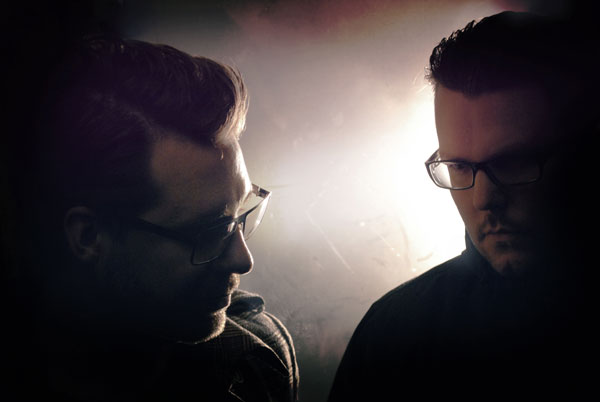 T.V.: And now I wonder how did you came up when you've formed the band with the name Hearts Of Black Science and what does it actually stands for? I believe that also in the bands name there must be some kind of a deeper meaning behind it?Tomas
T.V.: And now I wonder how did you came up when you've formed the band with the name Hearts Of Black Science and what does it actually stands for? I believe that also in the bands name there must be some kind of a deeper meaning behind it?Tomas: We had a few band names floating around as we were making our first demo. They were all horrible. I remember trying to describe the music we were making with words while waiting for Daniel to come back to the studio. To sort of distill it into a sentence. And that's what I came up with. I wrote it on the wall. It looked cool. Daniel saw it and loved it.
Hearts Of Black Science points to certain a combination of darkness and light which was something we tried to fuse into the songs right from the beginning. Alchemy is obviously the black science of combining elements to make something new and valuable. And that was, in maner of speaking, something we were trying to do with the music as well. Fusing together a creature out of parts of many styles of music. We also happen to record all our songs in a decommissioned power plant. It's all kind of mad science and Frankenstein. The name fits the set up.
T.V.: Have Hearts Of Black Science ever performed live? If not yet, have you thought of doing live performances in the future?Tomas: We've played live quite a bit. We've never properly toured which is a shame and is something that will hopefully change soon. But we played in England and Sweden a lot. Some other places. We played live on BBC 6 Radio a couple of times which was really cool. We have gigs in the works later this year.
T.V.: Do you have for live sets a proper live line-up with other musicians or are just you and Daniel playing everything?Tomas: We're often four or five people on stage. Usually a drummer, a second guitar to Daniel's lead guitar and someone on bass. I play a couple of synths and trigger the background tracks. It creates a bigger soundscape and adds a lot of energy to the live show. Daniel and I have done one or two gigs on our own in the past, but not many. It's a different dynamic. More personal. The sound is more like the album versions. I think we might do a couple of shows like that again.
T.V.: Let's return back to the album... If you'll have to choose, which song from Signal is your favorite and why?Tomas: Gun to head I'd say "Protector" is my personal favorite. It's first and foremost a good song, I think. It's also one of the stranger tracks on the album, in terms of how we "usually sound". I really like how it comes out of the gate like bulldozer and just keeps going. That incessant chugging is quite evocative. The chorus breaks the initial monotony in a nice way. You don't really expect it to be that melodic. It's like a sudden release of tension when the bass line switches notes for the first time. I'm quite proud of the production of it. The little details keep it interesting. A song like that could easily have become dull around the 2 minute mark. Plus, Daniel is great on it. The guitars are a bit understated compared to other songs but add a lot of mood and melody. And the vocals are just spot on. He changes his voice a little. He dramatizes the lyrics a bit more than usual. The whole song has a great sense of menace about it.
T.V.: And is in "Protector" where I sense a bit of Trent Reznor's (Nine Inch Nails, How To Destroy Angels) influence... Tell me, beside this obvious one, which bands/artists did make the biggest impact on your music?Tomas: I like
Nine Inch Nails. Especially Reznor's earlier stuff. But I wouldn't single him out as a particular source of inspiration for me personally. My favorite band of all time is
Skinny Puppy. They're often thought of as a very noisy and distorted musically. And for good reason. But I think there's a lot of beauty in their music too. So if there's an "industrial" edge to "Protector" it probably owes it to them.
Front 242's
Tyranny For You is one of my favorite albums. So is
Depeche Mode's late 80s - early 90s output. I love
Fields Of The Nephilim,
M83,
Kraftwerk,
Alphaville,
Ultravox,
Public Enemy,
Type O Negative,
Vangelis,
Def Leppard,
Aphex Twin,
The Cure... the list could go on forever.
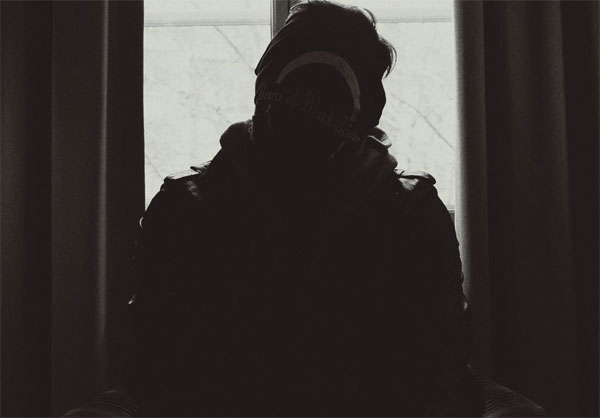 T.V.: I can't go by your mention of Def Leppard and Public Enemy, it certainly stands out among those and it's nice to see that your musical tastes are quite wide. Is this something that remained in your heart since your youth or do you started to listen and appreciate those bands later on? And yet, where does this influence reflects in your songs?Tomas
T.V.: I can't go by your mention of Def Leppard and Public Enemy, it certainly stands out among those and it's nice to see that your musical tastes are quite wide. Is this something that remained in your heart since your youth or do you started to listen and appreciate those bands later on? And yet, where does this influence reflects in your songs?Tomas: Well here's the thing; it's impossible to single out the influences really. I like
Mr.Mister and
REO Speedwagon. Italo music like
Laserdance and
Michael Cretu. I like
Carcass,
Meshuggah,
A Perfect Circle,
Author & Punisher and the soundtrack to Dirty Dancing.
Röyksopp,
The Knife,
Noisia,
Make Up And Vanity Set,
Carpenter Brut,
Mitch Murder. I find inspiration and ideas in all of that.
Public Enemy and
Def Leppard both had amazing production on their early records (I'm talking
Hysteria Leppard here. And
It Takes A Nation Of Millions To Hold Us Back of
Public Enemy). Completely different from each other but amazing in their own right. One is super slick production that sounds almost like synths rather than rock. And the other is multi sampled chaos. I had both on vinyl.
Jean Michel Jarre's
Zoolook is another super huge influence in my younger years. In terms of what you can do with sound and production. It was like listening to another world the first time I heard it.
T.V.: Can't argue with that. And while talking about the production, you did a great job on Signal. On some segments before you've already pointed it out, but please tell me if it was difficult to achieve such a deep and clear sound, and how are you satisfied with it?Tomas: Thanks! It's hard to say if I'm satisfied. You start to hear only the imperfections. But I think that the sound is very close to what we were going for. I mean, the whole soundscape of that album is drenched in reverb, which is a production faux pas for many. Traditionally you would have your reverb on a controlled channel and you'd send it to different instruments with some sort of precision. But I love the sound of different reverbs triggering off of different instruments to build up a space. There's a sense of scale but also an amount of chaos and bleed between tones that we allow and embrace. So, the job was really to try to pick out the details in the mix. Get them separated out of the white noise without cleaning up the image too much. I wrestled with those settings quite a bit. I'm particularly happy with the new ending to "We Saw The Moon" in that regard. There's so much going on in those last couple of minutes, but you can still enjoy the various pieces. I think we have four synths and maybe six guitars all going at the same time, all fed through reverb. It's a mix of digital shimmer reverbs and stomp boxes. The wall of sound it creates is quite heavenly. It's like gospel music for atheists. Outside of that it comes down to pure boring work. Will you sit down for hours and hours and do the fucking work of tweaking the micro details to get those little moments, you know. The stuff that most listeners won't care about but will miss subliminally if it isn't there. I felt I hadn't done it properly on every song on the previous album. Some things got left by the wayside. So I had a bone to pick and a personal need to try to get it right. Or at least, more right. You're never truly satisfied, of course. But I love doing it. Our mastering guy, Karl Daniel Lidén, also did a brilliant job of taming many of the wild frequencies and getting a real sense of coherence between the songs. He brought it all together once I had lost all objectivity over the material. Daniel also brought a good set of ears to the final stages.
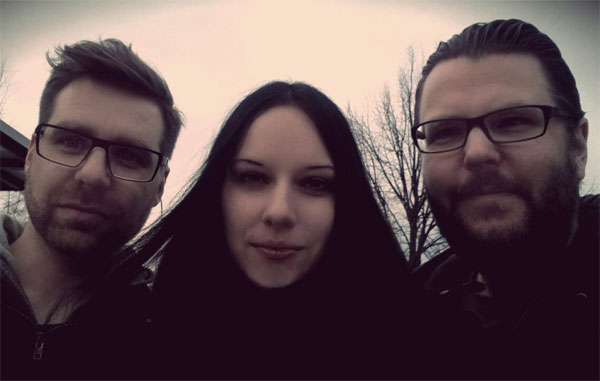 T.V.: That's what I call a detailed description, and yes I can almost see you there behind the knobs trying the best. My next question is about your label, Progress Productions, and how are you satisfied with them?Tomas
T.V.: That's what I call a detailed description, and yes I can almost see you there behind the knobs trying the best. My next question is about your label, Progress Productions, and how are you satisfied with them?Tomas: Progress is easily the best label experience we've had so far. I don't say this to throw any shade on our previous labels. Club AC30 did a lot for us on our first album. But I feel like we belong on Progress. Torny Gottberg, who runs the label has been exceptional in making us feel welcomed, loved and supported. He's a good friend now. It's been a great experience to release the album on Progress.
T.V.: It's good to hear this! Tell me, what are the plans for Hearts Of Black Science in the near future? I hope that we won't have to wait another six years for the next album...Tomas: We want to play live now. So the plans are focused on that. There's some other stuff coming up but I'm going to keep that a secret for now. We will do our best to update everybody as things solidify. Having found a home in Progress Productions means we have a proper pipeline in place now. We can focus on making music instead of administration. So yeah, it won't be another six years until the next album. I promise.
T.V.: I certainly hope so and will take you for word. And I hope to see you playing live someday near to my town. It's also well known that Daniel plays in Ison and Crippled Black Phoenix, beside Hearts Of Black Science. I'm interested if you have any musical side projects or if you take part of any other band?Tomas: Not a lot of released stuff from my side. I've made a few remixes for different bands throughout the years.
DK7 and
Dempsey, most notably. I also make a lot of the
Hearts Of Black Science remixes. There are other personal projects that I'm working on. But I want to make sure we've done everything with
Signal first before I start to focus on something else.
Hearts Of Black Science is pretty much a full time thing for me as it is. But yeah, there are things I'm kind of eager to get to.
T.V.: Ok Tomas, I think we covered a lot of things. Thank you very much for such detailed answers. Is there anything that you would like to say to your fans and our readers at the end of this interview?Tomas: Thank you for having me. This is probably the longest interview I've made. Lot's of great questions. It's been fun to remember and sort of document the production of the album. I just hope the readers won't fall asleep as I ramble on. The fans have been instrumental in keeping the band going. They've had to wait for the album for a long time, yet have managed to stay excited and supportive while we teased and promised. We're very thankful for that. Also, I want to thank Terra Relicta for having been supportive of
Signal and giving it glowing reviews. I hope to see you and our fans near a stage soon.
Hearts Of Black Science links: Facebook, Bandcamp, YouTube
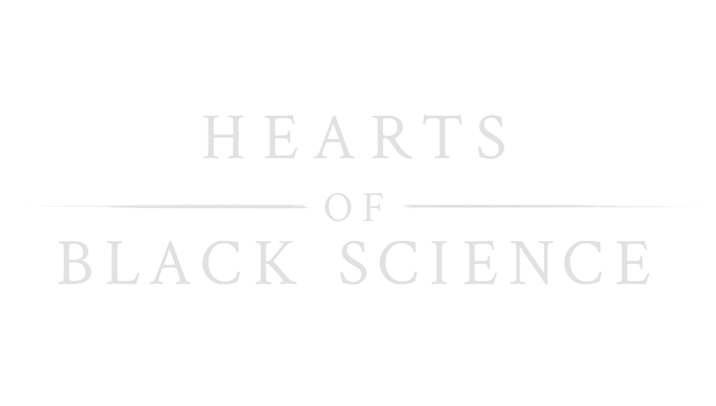

 One of the albums that we at Terra Relicta praised so much last year was of course Hearts Of Black Science' third full-lenght named Signal. It ended up second on our Terra Relicta Top 20 of 2015, was selected as Album Of The Month - November 2015, made entry into a couple of our personal top 10 charts, so all in all it's one of the greatest releases that came out last year. Fans of the Swedish duo, which consists of two multiinstrumentalists, Tomas Almgren and Daniel Änghede, had to wait six long years for this masterpiece to came out, since their previous album was released. On Signal, Tomas and Daniel developed their outstanding dark atmospheric pop music into unbeliveable heights and have without any doubt set some new standards into this, sometimes unduly overlooked style. Hearts Of Black Science were formed back in 2005, their debut album, The Ghost You Left Behind, saw the light of the world two years later and the sophomore one, The Star In The Lake, in 2009. They mention to be inspired and influenced by varius things, from horror movies, everydays life, power plants, to bands and artists like are The Cure, Fields Of The Nephilim, Type O Negative, Crippled Black Phoenix, Depeche Mode, M83, Godspeed You! Black Emperor, Mono, Ultravox and yet much more, but even so, Hearts Of Black Science are on a mission to create their own and unique sound with haunting melodies and dark atmospheres which are rarely to be found in such fractions. More things about the band, about new album, production, lyrics, future plans and many other background stuff, were explained by friendly Tomas Almgren who gave us a really detailed insight into it.
One of the albums that we at Terra Relicta praised so much last year was of course Hearts Of Black Science' third full-lenght named Signal. It ended up second on our Terra Relicta Top 20 of 2015, was selected as Album Of The Month - November 2015, made entry into a couple of our personal top 10 charts, so all in all it's one of the greatest releases that came out last year. Fans of the Swedish duo, which consists of two multiinstrumentalists, Tomas Almgren and Daniel Änghede, had to wait six long years for this masterpiece to came out, since their previous album was released. On Signal, Tomas and Daniel developed their outstanding dark atmospheric pop music into unbeliveable heights and have without any doubt set some new standards into this, sometimes unduly overlooked style. Hearts Of Black Science were formed back in 2005, their debut album, The Ghost You Left Behind, saw the light of the world two years later and the sophomore one, The Star In The Lake, in 2009. They mention to be inspired and influenced by varius things, from horror movies, everydays life, power plants, to bands and artists like are The Cure, Fields Of The Nephilim, Type O Negative, Crippled Black Phoenix, Depeche Mode, M83, Godspeed You! Black Emperor, Mono, Ultravox and yet much more, but even so, Hearts Of Black Science are on a mission to create their own and unique sound with haunting melodies and dark atmospheres which are rarely to be found in such fractions. More things about the band, about new album, production, lyrics, future plans and many other background stuff, were explained by friendly Tomas Almgren who gave us a really detailed insight into it. T.V.: And what was going on with Hearts Of Black Science since 2009 when you released The Star In The Lake?
T.V.: And what was going on with Hearts Of Black Science since 2009 when you released The Star In The Lake? T.V.: Very interesting... Now, as you mentioned that you've made the front cover artwork by yourself and you've already pointed out that there's a connection with music and lyrics, I wonder if you can give me kind of a deeper insight into it?
T.V.: Very interesting... Now, as you mentioned that you've made the front cover artwork by yourself and you've already pointed out that there's a connection with music and lyrics, I wonder if you can give me kind of a deeper insight into it? T.V.: Yes, she's a great singer and her voice fits so well into this song. But beside Heike you had also one another guest, this was the American singer Chrysta Bell, who is famous for recording with movie director David Lynch, and can you tell me more about how this collaboration started?
T.V.: Yes, she's a great singer and her voice fits so well into this song. But beside Heike you had also one another guest, this was the American singer Chrysta Bell, who is famous for recording with movie director David Lynch, and can you tell me more about how this collaboration started? Tomas: Generally I'll write the basis for the songs on my own. I spend a lot of time on getting the main part of a song right. I try a lot of versions until I'm content. I have small set up at home where I can dig in and focus on specific parts and get into the programming of sounds and so on. The songs are instrumental at this stage, but they usually have all the parts. Verses, choruses, beats, bass lines and hooks. But that too varies a little from song to song. Daniel has written a handful of demos across the three albums as well. But I'm probably responsible for something like 90% of the songs in terms of having written that first version of them. In the studio we will both listen, pick apart and make changes if needed. If there are parts missing we will do a quick copy-paste of some beats and then fix it there together. I sort of wear the producer hat in the studio and Daniel gets to be a bit more free and creative as we tackle his parts. Usually it starts with guitars. I will put the song on loop and Daniel will jam over that for a while until something starts to sound good. Daniel is an amazing guitar player. I always enjoy listening to him trying out ideas and melodies. I will offer up suggestions while he's playing and once we're both happy we'll record it. Then we build guitars in layers like that. In terms of bass guitar the decision is made whether to exchange my synth bass completely or to record a second dub over the synth to add more flavor. On some songs we've skipped the bass guitar altogether. Vocals are almost always the last thing we do. Daniel will listen to the song over and over and hum different melodies to himself. Once he's got an idea he wants to try we record a couple of takes of him singing it. Then we listen a few times and it either stays in or we start over. I'll ask him to try different things and suggest little tweaks in the melody or rhythm. But overall the vocals are really Daniel's domain. He will do a lot of harmonies and variants and we always build it up by having him doubling every take a few times. He's come a long way since the first record. It's really quite amazing to hear him sing on Signal now. There's a harmony in the last chorus on "We Saw The Moon" that floors me every time I hear it. Daniel's singing is such a crucial part of the Hearts Of Black Science sound. He puts a lot of work into it. Lately I've been writing a bit more of the lyrics. I like doing it and I'm pretty fast at coaxing some poetic nonsense together. On the first album Daniel did a bigger bulk of the writing as he was the singer and it perhaps seemed more natural that way. But I don't think Daniel is particularly interested in writing outside of music. I mean, if we talk about it as something you would do for fun on a Saturday night. I've written on and off since film school and I'm kind of enamored with the English language. So it works well as a collaborative effort. We always do it together in the studio. Ideas for lyrics come from everywhere. Some have more of a literal meaning and others are just moody and suggestive. It's common for us to come back after awhile and re-record parts and completely change things. But once that is done I set it up back home and start to mix all the new parts we've recorded. I also take a critical look at the parts that I had written originally. I'll mix the song and add a lot of details. Like fixing the beats by adding little rolls and ghost hits. I add effects to Daniels parts. More synths. So it's a long process. A lot of attention to detail at every step. It's a labor of love, really.
Tomas: Generally I'll write the basis for the songs on my own. I spend a lot of time on getting the main part of a song right. I try a lot of versions until I'm content. I have small set up at home where I can dig in and focus on specific parts and get into the programming of sounds and so on. The songs are instrumental at this stage, but they usually have all the parts. Verses, choruses, beats, bass lines and hooks. But that too varies a little from song to song. Daniel has written a handful of demos across the three albums as well. But I'm probably responsible for something like 90% of the songs in terms of having written that first version of them. In the studio we will both listen, pick apart and make changes if needed. If there are parts missing we will do a quick copy-paste of some beats and then fix it there together. I sort of wear the producer hat in the studio and Daniel gets to be a bit more free and creative as we tackle his parts. Usually it starts with guitars. I will put the song on loop and Daniel will jam over that for a while until something starts to sound good. Daniel is an amazing guitar player. I always enjoy listening to him trying out ideas and melodies. I will offer up suggestions while he's playing and once we're both happy we'll record it. Then we build guitars in layers like that. In terms of bass guitar the decision is made whether to exchange my synth bass completely or to record a second dub over the synth to add more flavor. On some songs we've skipped the bass guitar altogether. Vocals are almost always the last thing we do. Daniel will listen to the song over and over and hum different melodies to himself. Once he's got an idea he wants to try we record a couple of takes of him singing it. Then we listen a few times and it either stays in or we start over. I'll ask him to try different things and suggest little tweaks in the melody or rhythm. But overall the vocals are really Daniel's domain. He will do a lot of harmonies and variants and we always build it up by having him doubling every take a few times. He's come a long way since the first record. It's really quite amazing to hear him sing on Signal now. There's a harmony in the last chorus on "We Saw The Moon" that floors me every time I hear it. Daniel's singing is such a crucial part of the Hearts Of Black Science sound. He puts a lot of work into it. Lately I've been writing a bit more of the lyrics. I like doing it and I'm pretty fast at coaxing some poetic nonsense together. On the first album Daniel did a bigger bulk of the writing as he was the singer and it perhaps seemed more natural that way. But I don't think Daniel is particularly interested in writing outside of music. I mean, if we talk about it as something you would do for fun on a Saturday night. I've written on and off since film school and I'm kind of enamored with the English language. So it works well as a collaborative effort. We always do it together in the studio. Ideas for lyrics come from everywhere. Some have more of a literal meaning and others are just moody and suggestive. It's common for us to come back after awhile and re-record parts and completely change things. But once that is done I set it up back home and start to mix all the new parts we've recorded. I also take a critical look at the parts that I had written originally. I'll mix the song and add a lot of details. Like fixing the beats by adding little rolls and ghost hits. I add effects to Daniels parts. More synths. So it's a long process. A lot of attention to detail at every step. It's a labor of love, really.  T.V.: And now I wonder how did you came up when you've formed the band with the name Hearts Of Black Science and what does it actually stands for? I believe that also in the bands name there must be some kind of a deeper meaning behind it?
T.V.: And now I wonder how did you came up when you've formed the band with the name Hearts Of Black Science and what does it actually stands for? I believe that also in the bands name there must be some kind of a deeper meaning behind it? T.V.: I can't go by your mention of Def Leppard and Public Enemy, it certainly stands out among those and it's nice to see that your musical tastes are quite wide. Is this something that remained in your heart since your youth or do you started to listen and appreciate those bands later on? And yet, where does this influence reflects in your songs?
T.V.: I can't go by your mention of Def Leppard and Public Enemy, it certainly stands out among those and it's nice to see that your musical tastes are quite wide. Is this something that remained in your heart since your youth or do you started to listen and appreciate those bands later on? And yet, where does this influence reflects in your songs? T.V.: That's what I call a detailed description, and yes I can almost see you there behind the knobs trying the best. My next question is about your label, Progress Productions, and how are you satisfied with them?
T.V.: That's what I call a detailed description, and yes I can almost see you there behind the knobs trying the best. My next question is about your label, Progress Productions, and how are you satisfied with them?